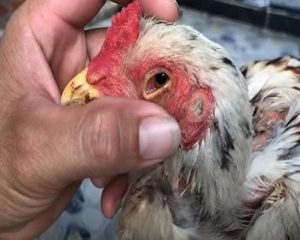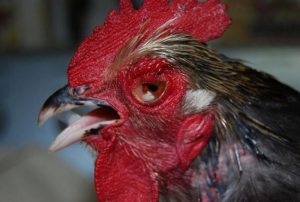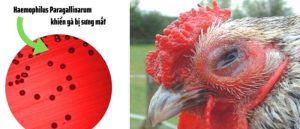Swollen Eyes in Chickens: Symptoms, Causes, and Effective Treatments
Swollen eyes in chickens is a common condition, especially when raising large flocks. If you are wondering how to recognize the symptoms of swollen eyes in chickens, understand the causes, and find the most effective treatments, this article from Thánh Gà is here to help.
What Does It Mean When a Chicken’s Eyes Are Swollen?
Swollen eyes and watery eyes in chickens can indicate various underlying health issues. While the condition might not seem immediately dangerous, it can lead to serious health problems, including blindness or death, if not treated promptly. It’s important for poultry farmers to monitor the health of their chickens regularly and take preventive and curative measures as soon as symptoms appear.

What Does It Mean When a Chicken’s Eyes Are Swollen?
Recognizing the Symptoms of Swollen Eyes in Chickens
- Swollen eyes in chickens can be easily identified as the symptoms are usually very apparent. This condition often occurs in chickens aged 1 to 2 months, with specific symptoms that include:
- Initial swelling in one eye, which can later affect both eyes.
- Redness in the eyes and the presence of excessive tearing.
- Swelling around the eye socket, sometimes leading to pus formation and conjunctivitis.
- Swelling in the head and face, with eyes tightly closed due to pain.
- The chicken may also appear lethargic, eat less, and have a runny nose.
- In addition to these symptoms, other signs may include head swelling, trembling, difficulty breathing, rapid breathing, weight loss, and coughing.
>>> Explore more: Kiến thức nuôi gà
Causes of Swollen Eyes in Chickens
Several factors can cause swollen eyes in chickens. The most common causes include infections, bacterial contamination, parasitic worms, and environmental conditions.
- Infections: When chickens show symptoms such as swollen eyes with foam, diarrhea, lethargy, sensitivity to light, crooked necks, fever, drooping wings, ruffled feathers, or head swelling, they may be suffering from infections like Coryza, APV, or CRD, which can lead to eye swelling.
- Bacteria: The bacterium Haemophilus paragallinarum, also known as Avibacterium paragallinarum, is another common cause of swollen eyes in chickens. This bacterium can survive outside the body for 2-3 days and can infect chickens of any age. However, it is susceptible to high temperatures and disinfectants like 70% alcohol, potassium permanganate, and Benkocid.
- Parasitic Worms: Parasitic worms in chickens can be particularly dangerous, as they have a high potential for causing eye swelling. These parasites can migrate to the eye area, causing pain and inflammation. Regular deworming is crucial in preventing this issue.
- Environmental Conditions: Poor living conditions, such as dirty, damp, or poorly ventilated coops, can also lead to swollen eyes in chickens. Ammonia buildup from waste or dusty environments can irritate the chickens’ eyes, causing swelling. Eye swelling can also occur if dust, dirt, or other foreign objects get into the eyes.

Causes of Swollen Eyes in Chickens
Clinical Signs and Effective Treatments for Swollen Eyes in Chickens
Treatment for swollen eyes in chickens depends on the specific symptoms and underlying causes. Here are some common scenarios and how to effectively treat them:
- Swollen Eyes with Pus, Foam, and Tears: If the chicken’s eyes are swollen with pus, foam, or excessive tearing, it may be suffering from an infection like conjunctivitis caused by the Chlamydia bacterium. Treatment involves:
- Administering Oxytetracycline and Kanamycin as per the dosage instructions on the package for 7 consecutive days.
- Supplementing the chicken’s diet with a multivitamin and Gluco-C for 3-5 days.
- Mixing digestive enzymes, B-complex, Premix, and ADE vitamins into the feed for 1 month.
- Replacing bedding and disinfecting the coop regularly to prevent bacterial growth.

Swollen Eyes in Chicks:
- Swollen eyes in chicks may result from respiratory infections like CRD or eye infections. The recommended treatment is:
- Using Florfenicol combined with Oxytetracycline, Doxycycline, or Gentamicin at half the recommended dose on the packaging.
- Swollen Eyes and Head Swelling: Chickens with swollen eyes and head swelling might be suffering from Coryza, which often leads to conjunctivitis with discharge. Treatment includes: Administering Gentatylo, Tylosin, Tiamulin, Tilmycosin, Doxy 50, or Doxy 75, combined with Enrofloxacin at 10-20%, for 5 to 7 days.
- Applying Gentamicin eye drops and nasal drops 2 times a day for 3-5 days.
- Swollen Eyes Due to Parasitic Worms: When parasitic worms are the cause of eye swelling, deworming is necessary, along with applying Gentamicin eye drops twice a day.
- Environmental Causes: If the swelling is due to environmental conditions, take the following steps:
- Check and replace the bedding if it is damp or has an unpleasant odor.
- Disinfect the coop regularly to kill potential pathogens.
- Ensure proper ventilation and avoid overcrowding.
- Supplement the chicken’s diet with ADE vitamins, Premix minerals, Multivitamin C, and liver detox supplements for 10-15 days.
- Use Gentamicin and Ivermectin as eye drops for affected chickens according to package instructions for 5-7 days.
- Mix Doxy 50 and Enroflox 20% into the feed for 5-7 days.

